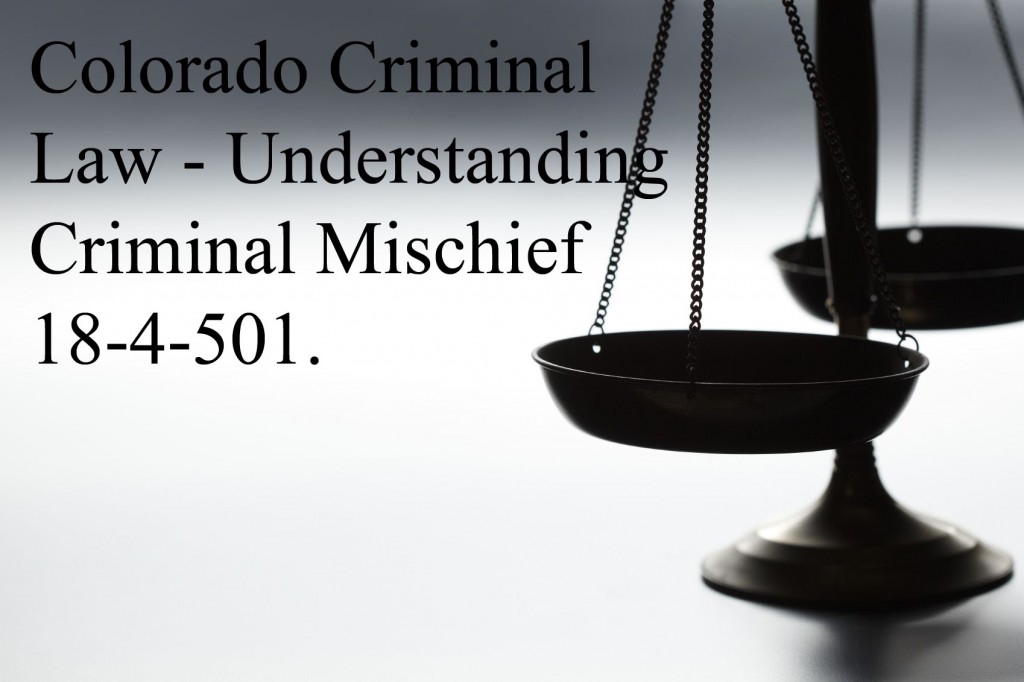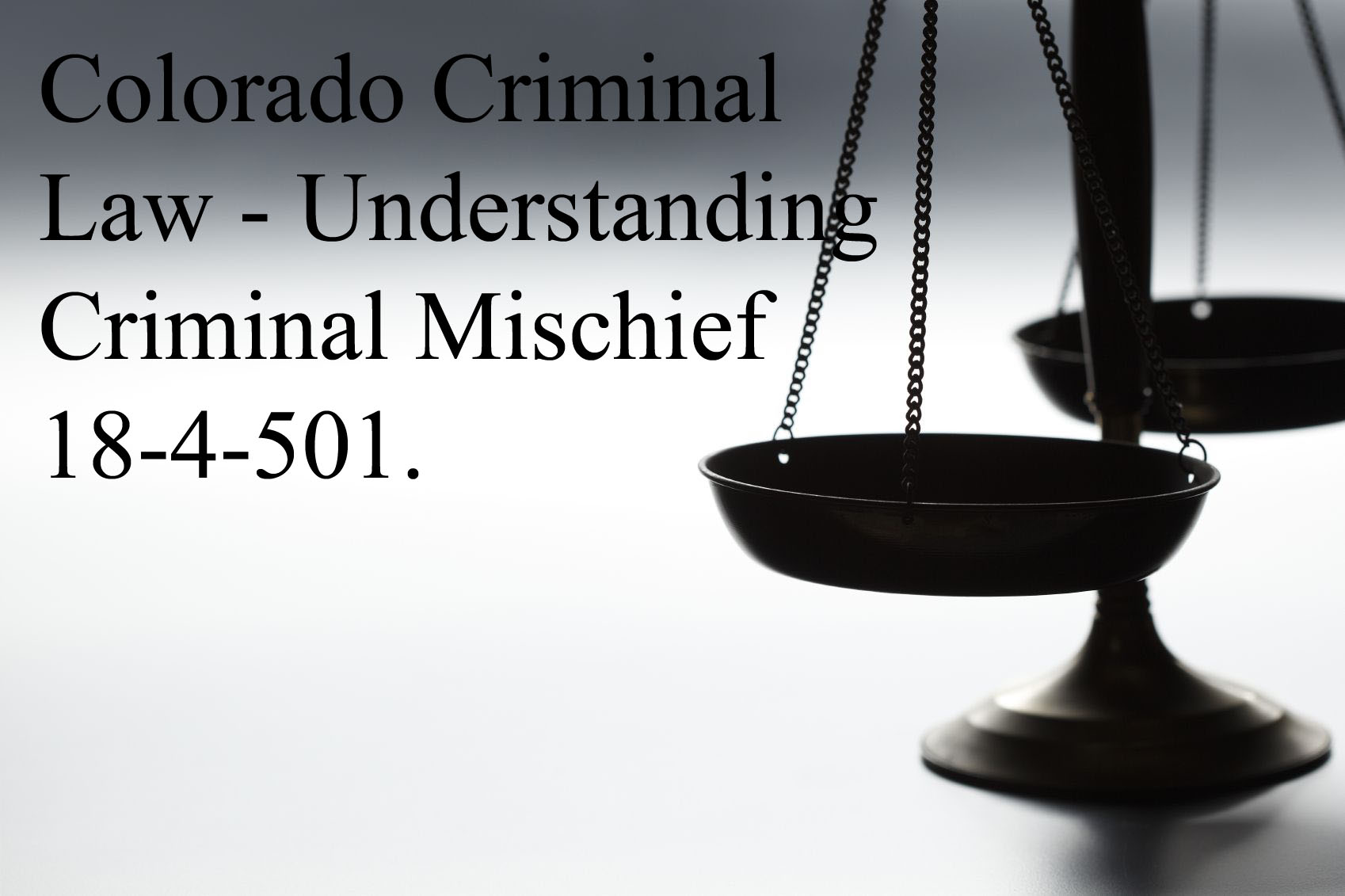




Colorado Criminal Law – Understanding Criminal Mischief 18-4-501
By H. Michael Steinberg- Colorado Domestic Violence Criminal Mischief Criminal Defense Lawyer
 Colorado Criminal Law – Understanding Criminal Mischief 18-4-501 – To understand the Colorado Crime of Criminal Mischief – as in all Colorado criminal charges – you must start with the law itself.
Colorado Criminal Law – Understanding Criminal Mischief 18-4-501 – To understand the Colorado Crime of Criminal Mischief – as in all Colorado criminal charges – you must start with the law itself.
In Colorado – Criminal Mischief is defined as:
18-4-501. Colorado Criminal Mischief
(1) A person commits criminal mischief when he or she knowingly damages the real or personal property of one or more other persons, including property owned by the person jointly with another person or property owned by the person in which another person has a possessory or proprietary interest, in the course of a single criminal episode.
To Understand The Level Of Punishment For The Crime of Criminal Mischief:
…if one is charged with this crime – the focus is on the value assigned to the damage caused.
Here are the gradations of punishment based on the amount of damage:
Criminal mischief is:
(a) A class 3 misdemeanor when the aggregate damage to the real or personal property is less than three hundred dollars;
(b) A class 2 misdemeanor when the aggregate damage to the real or personal property is three hundred dollars or more but less than seven hundred fifty dollars;
(c) A class 1 misdemeanor when the aggregate damage to the real or personal property is seven hundred fifty dollars or more but less than one thousand dollars;
(d) A class 6 felony when the aggregate damage to the real or personal property is one thousand dollars or more but less than five thousand dollars;
(e) A class 5 felony when the aggregate damage to the real or personal property is five thousand dollars or more but less than twenty thousand dollars;
(f) A class 4 felony when the aggregate damage to the real or personal property is twenty thousand dollars or more but less than one hundred thousand dollars;
(g) A class 3 felony when the aggregate damage to the real or personal property is one hundred thousand dollars or more but less than one million dollars; and
(h) A class 2 felony when the aggregate damage to the real or personal property is one million dollars or more.
At Trial For Criminal Mischief Cases Juries Are Instructed On The Following Elements Of Criminal Mischief:
4-5:01 CRIMINAL MISCHIEF 18-4-501
The elements of criminal mischief are:
1. That the defendant,
2. in the State of Colorado, at or about the date and place charged,
3. knowingly,
4. damaged the real or personal property of one or more other persons, including property owned by the defendant jointly with another person or property owned by the defendant in which, at the time of the damage, another person had a possessory or proprietary interest,
5. in the course of a single criminal episode.
[6. and that the defendant’s conduct was not legally authorized by the affirmative defense[s] in Instruction[s] ___.]
The Role Of Economic Loss In Colorado Criminal Mischief 18-4-501Cases
The requirement of damage – the damage “element” of the crime of criminal mischief arises out of the economic loss caused by the “knowing infliction of damage tothe real or personal property of another.” This is an “essential element” to prove the crime.
The actual value of the damage is usually determined by market value, – the price a willing buyer would pay for the undamaged object in the open market. If there is no market the Court looks at:
-
-
- The original purchase price,
- Replacement cost,
- The general use and purpose of the article,
- The salvage value of the article.
-
Colorado Criminal Mischief Cases 18-4-501- Where There Is A Dispute Over The Value Of The Damage During Trial
Of, during the course of a criminal mischief trial – the parties dispute the value of the article damaged and the evidence conflicts on that subject – the jury is given what is called an “interrogatory.” The interrogatory or questionnaire asks the jury to specifically find the value from the evidence produced during the trial.
Colorado Criminal Mischief Often Charged In Colorado Domestic Violence Charges
in Colorado domestic violence cases – criminal mischief – as an act of domestic violence – is often charged based on their destruction of the victim’s or jointly – community owned property.
It is often believed by the accused in Colorado Domestic Violence Cases that a husband does not has a right to destroy the property of the marriage or even property he has given his because he has “an ownership interest” in the property. This is not true. Ownership – as outlined in the law itself …
“the real or personal property of one or more other persons, including property owned by the defendant jointly with another person or property owned by the defendant in which, at the time of the damage, another person had a possessory or proprietary interest,”
To understand “community property” one needs to understand that each owner has an equal ownership interest and, although undivided, Colorado criminal law protects from the unilateral and “non-consensual” damage or destruction by the other marital partner.
Criminal Mischief Often Reaches Felony Domestic Violence Levels Where The Injuries Do Not
In Colorado if one causes “bodily injury” but not serious bodily injury and no deadly weapons are involved – the charge is third degree assault – a misdemeanor. But if the accused damaged the property of the victim – the value of the damaged or destroyed property can take the crime to felony levels. LINK Today a large flat screen TV easily makes this felony level and can launch was only a minor injury to the victim into District or Felony Court.
A Strange Twist To The Law Of Criminal Mischief – The Intent To Damage – 18-4-501
To be guilty of the crime of criminal mischief you must “knowingly” commit the crime. That means you cannot negligently or even recklessly commit the crime of criminal mischief. So if your son is playing football in the street and he lands – accidentally – on the neighbor’s car – this cannot be criminal mischief because it was an accident.
Colorado’s criminal mischief law does NOT include recklessness. This is important because many situations in – for example Colorado Domestic Violence cases – result in damage to property that was never intended.
The Model Penal Code – which is the basis for many of Colorado’s criminal laws – defines criminal mischief more broadly than Colorado and the distinction is important:
Section 220.3. Criminal Mischief.
(1) Offense Defined. A person is guilty of criminal mischief if he:
(a) damages tangible property of another purposely, recklessly, or by negligence in the employment of fire, explosives, or other dangerous means listed in Section 220.2(1); or
(b) purposely or recklessly tampers with tangible property of another so as to endanger person or property; or
(c) purposely or recklessly causes another to suffer pecuniary loss by deception or threat.
Colorado Criminal Law – Understanding Criminal Mischief 18-4-501
If you found any information I have provided on this web page article helpful please click my Plus+1 or the Share button below so that others may also find it.
Never stop fighting – never stop believing in yourself and your right to due process of law.
ABOUT THE AUTHOR: H. Michael Steinberg – Email The Author at [email protected] – A Denver Colorado Criminal Defense Lawyer – or call his office at 303-627-7777 during business hours – or call his cell if you cannot wait and need his immediate assistance – 720-220-2277. Attorney H. Michael Steinberg is passionate about criminal defense. His extensive knowledge and experience of Colorado Criminal Law gives him the edge you need to properly handle your case.
 You must make a responsible choice for a Colorado Criminal Defense Lawyer – we encourage you to look at our firm. Over the last 40 plus years – H. Michael has mastered nearly every area of criminal law, procedure and trial and courtroom practice and he is passionate about getting you the best result in your case. He has written and continues to write extensively on Colorado criminal law and he hopes this article – – helps you in some small way. H. Michael hopes you found this page helpful – Colorado Criminal Law – Understanding Criminal Mischief 18-4-501.
You must make a responsible choice for a Colorado Criminal Defense Lawyer – we encourage you to look at our firm. Over the last 40 plus years – H. Michael has mastered nearly every area of criminal law, procedure and trial and courtroom practice and he is passionate about getting you the best result in your case. He has written and continues to write extensively on Colorado criminal law and he hopes this article – – helps you in some small way. H. Michael hopes you found this page helpful – Colorado Criminal Law – Understanding Criminal Mischief 18-4-501.

Other Articles of Interest:
- Colorado Criminal Law – Understanding An Allegation Of Stalking Behavior – The Crime Of Stalking in Colorado
- Why Police And Prosecutors Overcharge In Colorado Domestic Violence Cases
- Key Colorado Domestic Violence Issues
- Understanding Colorado Domestic Violence Crimes – Wiretapping 18-9-303 C.R.S. vs Obstructing Telephone Service- C.R.S. 18-9-306.5
- Understanding The Difference Between Colorado Domestic Violence And Actual Domestic Abuse












